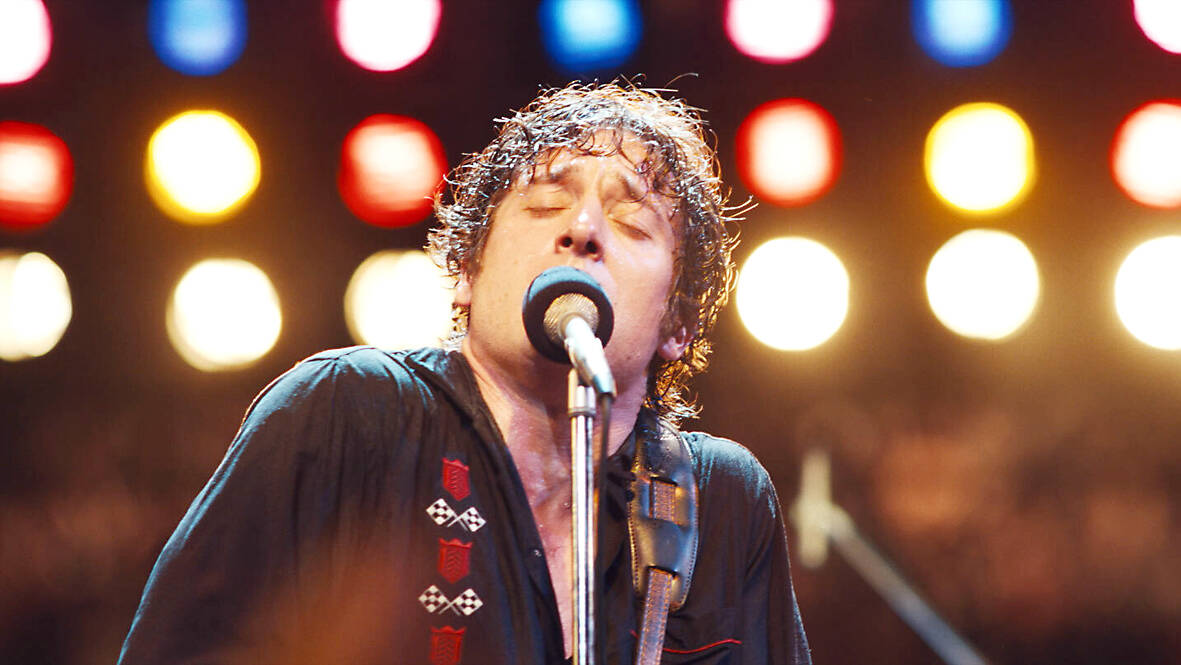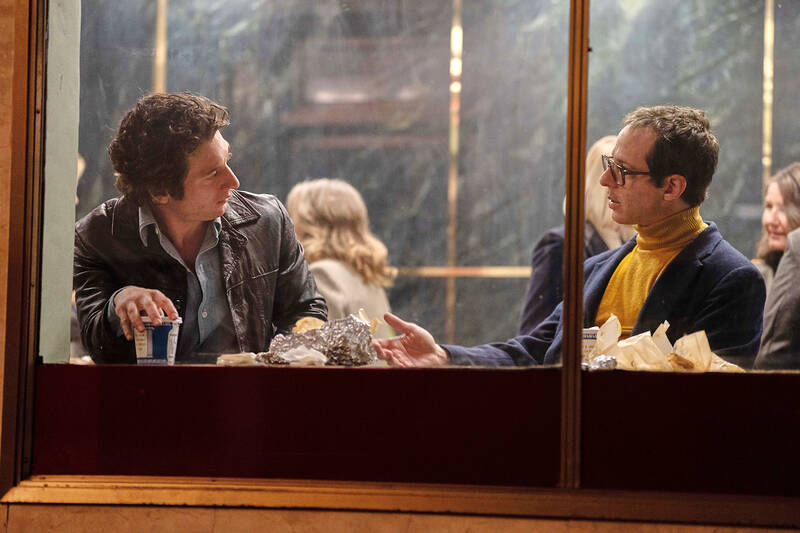In his 500-page memoir, Born to Run, Bruce Springsteen spends less than three pages on the making of his 1982 album Nebraska. Moving on, folks, nothing to see here, he seems to be saying.
The first authorized biopic of his life — Springsteen: Deliver Me From Nowhere — disagrees, delving deep into the inner turmoil The Boss was dealing with during its recording and then surfacing with an endearing, humbling portrait of an icon by a soulful Jeremy Allen White.
With heavy-lidded eyes and his head nearly almost cocked at an angle, White gives us a wretched Springsteen, open-mouthed in ecstasy when playing live but sunken in his leather jacket while roaming the streets. He sucks on his harmonica as if it could release him from pain itself. To be honest, White hasn’t stepped much out of his hangdog, tortured sweet spot. He’s the chair of the Tortured Poets Department.

Photo: 20th Century Studios via AP
The anti-commercial Nebraska is not the first album you might think of when you imagine pivotal Springsteen albums. Born to Run was made on the verge of him being cut by Columbia Records. Born in the U.S.A. turned him into a global superstar.
Scott Cooper, the film’s director and screenwriter, finds Nebraska, nestled between those albums, to be the more enlightening. It seemed painfully pulled through Springsteen and deposited on a rudimentary four-track cassette recorder in a rented house in Colts Neck, New Jersey. Springsteen wants it released as is, imperfections and miscues intact.
Nebraska may be a masterpiece but it’s not an easy listen, filled with broken and desperate people, killers, heavy drinkers, inmates and folks pushed to the edge by poverty and hopelessness. “Definitely not Hungry Heart,” says the tech who helped record it.

Photo: 20th Century Studios via AP
“It’s not about capturing sounds as much as ideas,” Springsteen tells his manager, Jon Landau, played lovingly by Succession star Jeremy Strong. “I’m just trying to find something real in all the noise.”
This Landau, who quotes Flannery O’Connor and adores Sam Cooke, is almost saintly in his devotion to Springsteen, even if he’s not sure where the songs are coming from. We all need someone like Landau — endlessly encouraging, creating creative space for his client and beating back the suits.
The record executives are, naturally, aghast at Nebraska, which is called a “highly unorthodox career move.” They want radio hits not acoustic doodles of felons. “It sounds like an accident. It sounds unfinished,” record honcho Al Teller declares.
The movie — built from a book by Warren Zanes and featuring vocals that mix White’s and Springsteen’s — is a meditation on creativity in battle with commerciality, the yearn to run from home and also the inescapable pull of family. “I’m lost here. I’m buried here,” Springsteen wails.
Though grounded in the weeks during the making of Nebraska, the script moves back in time to show scenes from Bruce’s early life. A drive to his old house dissolves into black-and-white memories of Springsteen’s father (Adolescence creator-star Stephen Graham, fearsome) being violent and drunk. Their complicated relationship is thoughtfully handled. (The movie is dedicated to Cooper’s dad.)
As if that’s not enough, Springsteen’s love life is explored through a composite character, Faye, a single mom and waitress who falls for a guy incapable at this time of settling down. Odessa Young is astonishing — half tough Jersey chick, half melting when The Boss stops by. “I know you’re scared,” she tells him.
There are also special moments for true Springsteen fans, like the time a young Bruce visits a graceful old house that will, of course, be the inspiration for Mansion on a Hill. Or the moment when Springsteen edits his Nebraska lyrics, changing “he” to “I.”
The film rather courageously culminates with a call for Springsteen to get mental health help, which he does. We soon realize that what we’ve been watching for two hours is a man’s gradual breakdown, not what most biopics of superstars would pull the curtain back on. In many ways, this movie is, then, a mirror of Nebraska itself — unexpected, complicated and very American gothic.

The Lee (李) family migrated to Taiwan in trickles many decades ago. Born in Myanmar, they are ethnically Chinese and their first language is Yunnanese, from China’s Yunnan Province. Today, they run a cozy little restaurant in Taipei’s student stomping ground, near National Taiwan University (NTU), serving up a daily pre-selected menu that pays homage to their blended Yunnan-Burmese heritage, where lemongrass and curry leaves sit beside century egg and pickled woodear mushrooms. Wu Yun (巫雲) is more akin to a family home that has set up tables and chairs and welcomed strangers to cozy up and share a meal

Dec. 8 to Dec. 14 Chang-Lee Te-ho (張李德和) had her father’s words etched into stone as her personal motto: “Even as a woman, you should master at least one art.” She went on to excel in seven — classical poetry, lyrical poetry, calligraphy, painting, music, chess and embroidery — and was also a respected educator, charity organizer and provincial assemblywoman. Among her many monikers was “Poetry Mother” (詩媽). While her father Lee Chao-yuan’s (李昭元) phrasing reflected the social norms of the 1890s, it was relatively progressive for the time. He personally taught Chang-Lee the Chinese classics until she entered public

Last week writer Wei Lingling (魏玲靈) unloaded a remarkably conventional pro-China column in the Wall Street Journal (“From Bush’s Rebuke to Trump’s Whisper: Navigating a Geopolitical Flashpoint,” Dec 2, 2025). Wei alleged that in a phone call, US President Donald Trump advised Japanese Prime Minister Sanae Takaichi not to provoke the People’s Republic of China (PRC) over Taiwan. Wei’s claim was categorically denied by Japanese government sources. Trump’s call to Takaichi, Wei said, was just like the moment in 2003 when former US president George Bush stood next to former Chinese premier Wen Jia-bao (溫家寶) and criticized former president Chen

President William Lai (賴清德) has proposed a NT$1.25 trillion (US$40 billion) special eight-year budget that intends to bolster Taiwan’s national defense, with a “T-Dome” plan to create “an unassailable Taiwan, safeguarded by innovation and technology” as its centerpiece. This is an interesting test for the Chinese Nationalist Party (KMT), and how they handle it will likely provide some answers as to where the party currently stands. Naturally, the Lai administration and his Democratic Progressive Party (DPP) are for it, as are the Americans. The Chinese Communist Party (CCP) is not. The interests and agendas of those three are clear, but